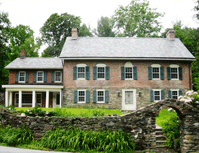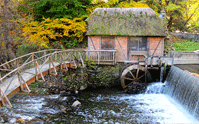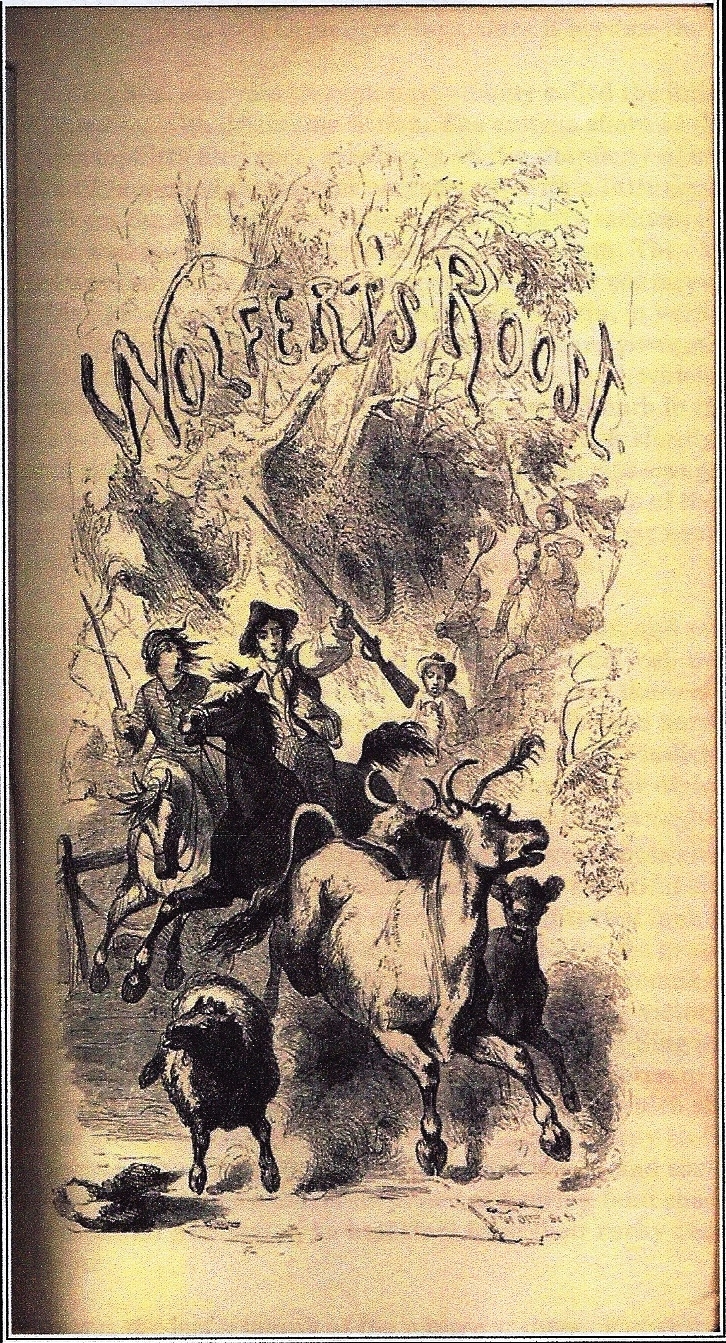



| Wolvert Ecker- Owner from 1772 to 1799
Wolvert Ecker (1730-1799) was born in Sleepy Hollow and descended from a prominent Dutch family that arrived in New Netherlands in 1655. Wolvert was the namesake grandson of Frederick Philipse's good friend Wolfert Ecker who was immortalized in Washington Irving's story "Wolfert’s Roost." On January 13, 1772, Wolvert purchased the Gomez Mill House and 1,000 acres at the Ulster County sheriff's foreclosure on Jacobus Van Blarcken. Ecker's winning bid was 835 pounds, 19 shillings. When Gomez built the original one-story fieldstone blockhouse, he dug into a hill on the north side for his rear wall. Ecker added a brick second floor twice as deep as Gomez's structure, with a rear entrance on top of the hill. He added a high peaked attic, and broke through the blockhouse's rear stone wall to carve root cellars into the hill.* Ecker developed the house in a vernacular five bay version of the popular Georgian style. Employing local building traditions to make the bricks, Ecker used homemade moulds and clay from the banks of the Hudson. The bricks were made in the meadow across the road. The upper story centerpiece for the symmetrical house was a Palladian window that no longer exists. The bricks, laid in Flemish bond in some walls, Liverpool bond in others, is distinctive. On the east side, using bricks purposely glazed black by hot fires in the kiln, is a design of a heart and diamond. Later resident Dard Hunter continued using this theme, adding a wrought iron heart to the front door and carved hearts in some of the window shutters; he also used a heart shaped watermark in his handmade paper. Wolvert Ecker was a locally prominent Revolution-era patriot. The Mill House at Ecker’s farm was a center for Whig activity. Ecker was Chairman of the Committee of Safety and Observation in Newburgh, a Town Supervisor there in the late 1770s, and a Justice of the Peace in Marlboro from 1778 until his death. He was also commissioned First Lieutenant on December 1, 1775 in the New Marlborough Company, Southern Regiment of Minutemen. On the Sabbath, area farmers and residents would gather at this house and Wolvert would open the meetings with a reading from his old Dutch family Bible, after which they discussed war news and planned anti-Tory activities. After the war, Wolvert Ecker prospered with several mills on what was Jew's Creek, now Ecker’s Creek, a ferry across the Hudson, a packet line to New York, and commercial activities in the region. He passed away from oral cancer on his birthday, January 17, 1799. His wife stayed at Mill House until she remarried in 1800. Wolvert’s son, Colonel William Ecker, owned the House from 1800 until his death 1827. William went in for sports, good living, and politics. The order of preference reveals that, until his 1826 election to the NYS Assembly- he died that spring from a heart attack, on the Assembly floor- William's gambling habits got the better of him. The Mill House and adjacent 200 acres (800 were divided among his siblings when Wolvert died) were sold as they were acquired by his father- at a foreclosure sale. The buyer was Edward Armstrong of Danskammer. * - The Armstrongs removed the hill, converting the root cellars to a dining room and library. The 2nd floor entrance was moved down after 1924 to a newly exposed 'first' floor in the back, level with the front of the blockhouse. |
Home | About Us | Gallery G | Events | Donations | Membership | Visitors | Volunteers | Press | Contact Us | Directions | Privacy


